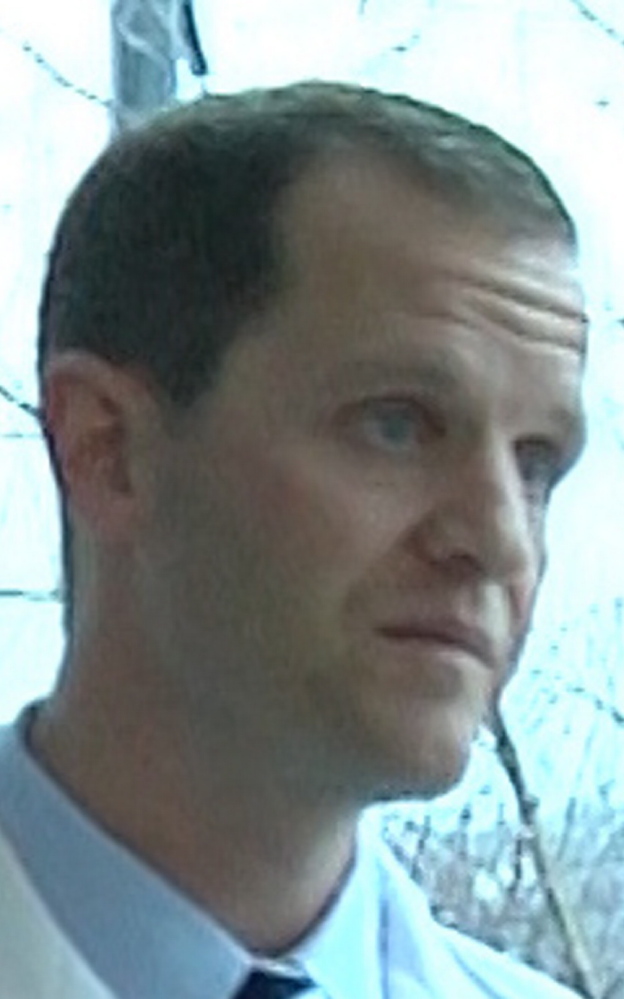Whoa. Take a deep breath, says Dr. Michael Collins to the children, men and women who come to the University of Pittsburgh Medical Center fearing they have a brain concussion. He knows they dread the thought of hearing their athletic careers are over.
We live in a world, he says, where the pendulum has swung from ignorance of head injuries to hysteria. He offers help and hope. He has a better chance than ever to get them back on the football fields or hockey rinks or ski slopes or wherever they were injured.
If he still sees or hears their anxiety, Collins will walk them into the hallway outside his office. He’ll point to the mementos grateful athletes have sent him. One in particular, from David Ross, the catcher of Collins’ beloved Red Sox, is popular with visitors from New England.
Collins helped get Ross back behind the plate in time for Boston’s run to last year’s World Series win. For the doctor who was cut from the University of Southern Maine baseball team nearly 25 years ago, there might not have been a greater reward.
Collins will get another reward Saturday night at the Husky Hall of Fame banquet. The son of teachers from Hermon, he’s the recipient of this year’s Dr. Richard A Costello Special Achievement Award.
Maybe his career as a USM outfielder and pitcher have been forgotten, but his work as a founder of the Sports Medicine Concussion Program at the University of Pittsburgh Medical Center should be on everyone’s mind. Established in 2000, it was the first program of its kind. Doctors there understand traumatic brain injuries vary, and they come up with different treatments and strategies to help people recover.
“We see 20,000 patients a year,” said Collins. “Five years ago we had to retire maybe a hundred athletes. This year maybe five. The perception was you’d have to sit in a dark room away from activity. That’s far, far from the truth. We’re hoping the day is coming when this injury is like any other. You have to rehab them the right way.
“It’s time to stop thinking of head injuries as the boogeymen of sports. There are many, many misperceptions. We have treatments. We can get people back to playing their sport.”
Collins isn’t saying head injuries should be taken less seriously. Ignoring headaches or double vision or any of the symptoms compounds the initial injury. Repeated concussions left untreated can have long-term consequences.
Collins is saying science is catching up. Ross followed a program of exercises given by the concussion program and recovered. “Who could believe I couldn’t play with my kids without getting dizzy at home and then I’m catching the last out of the World Series. Crazy,” said Ross in an ESPN.com story last week.
Collins recalls his youth. “We started with smelling salts and ‘How many fingers am I holding up?’ I remember watching Monday Night Football and listening to Al Michaels talking about (49ers quarterback) Steve Young and his concussions. I remember when Ricky Craven (crashed several times) and suffered concussions. Eric Lindros in hockey. Something was missing. We don’t know anything.”
Collins majored in pyschology and biology at USM. He played baseball for Coach Ed Flaherty and dreamed that would be his career. He was on the 1989 team that qualified for the national finals in Bristol, Connecticut. “Then Bobby Prince showed up,” said Collins, referring to the outfielder and future college coach who set USM hitting records. Collins lost his spot. “It was a difficult time for me. I wasn’t happy. I was frustrated. But it was the best thing that happened to me.”
He was one of about 15 students selected from 600 applicants to Michigan State’s doctorate program in clinical pyschology. “I looked around the table at our first meeting. There was someone from Harvard, Yale, Michigan and me from USM. I was in the deep end of the pool wondering if USM had prepared me. It did.”
Collins, who is treating Brock Holt now, will never lose his loyalty to the Red Sox.
Just don’t tell anyone he’s now a Pittsburgh Steelers fan.
Send questions/comments to the editors.


